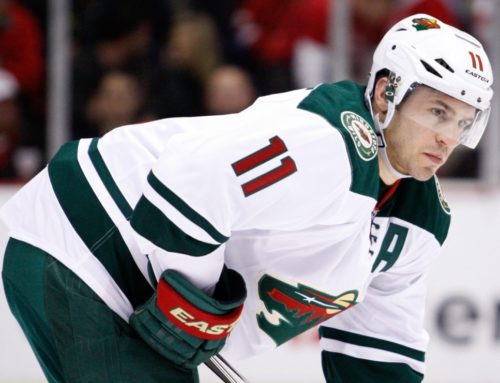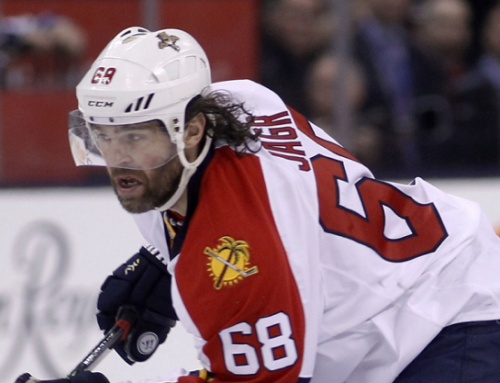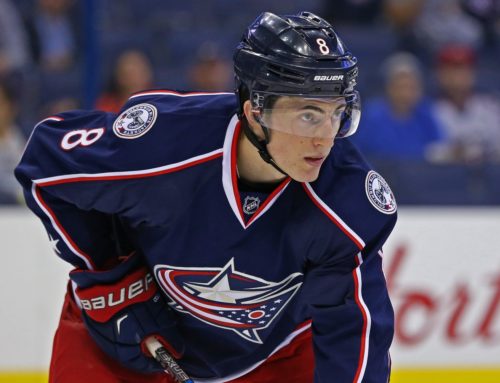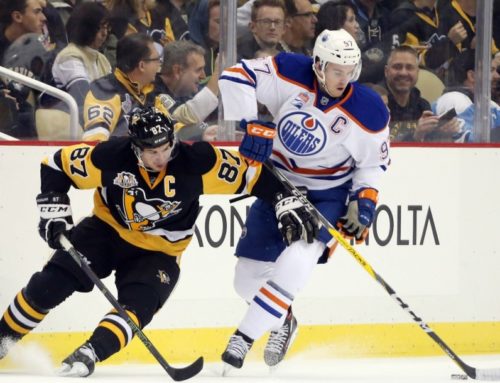
What can be done to keep teams from tanking, both in real hockey and fantasy hockey?
Mark March 26 and 30 on your calendars. Mike Harrington of the Buffalo News suggests in his piece, titled "Tank convoy rolling in Arizona as Yandle dealt to Rangers", that the NHL will be watching these games closely as they could determine who ends up dead last in the NHL this year.
Buffalo has six of its remaining games against other tanking teams. Columbus has five. Edmonton, Carolina and Toronto have four each. Arizona only has two, which are the ones against Buffalo.
There are always whispers in any season about tanking when a team does not do very well. It could be at the start, in the middle or now as the end nears. Tanking involves improving one's chances to secure the first overall pick in the entry draft.
Oh the horror! Tanking is irreprehensible. No respectable player, coach, management team would ever purposely do such a thing.
Pierre LeBrun of ESPN.com quotes Josh Gorges in his "Tanking or trying? Sabres answer" article as saying "losing on purpose to get the high draft pick, it’s ridiculous. Never in my life have I heard about losing on purpose. Never. That’s one of the most asinine things I’ve ever heard of in my life. People can have their opinions, that’s one of the great things of pro sports is talking about all kinds of things, that’s the world we live in, but it’s our job as players in here to ignore it."
In another article by Harrington called "New goaltender Johnson calls TSN tanking interview 'disrespectful'" he quotes Chad Johnson as saying "If you don’t play to win, then you shouldn’t be playing. That’s my mindset. I want to come in here and compete. Play as many games as I can and win as many games as I can.”
"Players are paid to win, coaches are paid to win, and I’m paid to win. If we tanked in order to rebuild, I wouldn’t be around for the rebuild," Don Maloney, GM of the Arizona Coyotes, was quoted as saying to Craig Morgan of FoxSports.
Yet it happens. Ron Wilson, former coach of the Washington Capitals, said that he was told to tank, as is stated in this National Post article "Tanking is pro sports' worst kept secret, right Buffalo Sabres fans?", written by Scott Stinson.
His players were unaware so they tried their best, and even though Wilson refused to tank, the Capitals "did finish on a 2-10 run that year" wrote Stinson. They did not get the first overall pick but they dropped low enough in the standings to get the player they wanted, which happened to be Kris Beech. As the article states, "[he] currently plays for TWK Innsbruck in the Austrian league". So in this case tanking did not help the team, but it also shows that tanking is more than just getting the first overall pick.
So what is so troublesome? If it is in the rules, or better yet not explicitly prohibited, then what is the problem?
The integrity for the players, team, management and the league is what is at stake. Rules about these same individuals are not allowed to bet on or fix games yet they can kind of, wink-wink, drop a game here or there to better their draft spot.
Even if fans embrace the tanking philosophy, teams risk too much, especially if they are in small markets that cannot afford to have poor attendance.
In fantasy hockey related terms, imagine if you have an owner who is 'rebuilding' and decides not to place any importance on his team for the current season. They opt to draft unsigned rookies, prospects and hoard draft picks. If in the future, the majority of their players turn out to be great, then they look like a genius, but what happens if the prospects fizzle or flop? Then that owner has a whole lot of nothing and guess what, they are looking fast for a way to drop out of your fantasy league. It destabilized the franchise to a point where hardly anyone would want it and also the league because now you have to deal with contraction, and future prize amounts are fewer too.
Shane Sander of the Hockey Writers has in his article "Is Tanking Dead? The Story of the NHL Draft Lottery" a link to a paid advertisement in the Edmonton Journal by some of their fans who are tired of what is occurring with the Oilers. At least they are being vocal because they care. It is when they go silent that you know trouble is forming. The latest set of changes to the NHL's draft lottery this year and next are also explained nicely.
Sander also gives us a bit of a history lesson, "the Penguins tanked and got Mario Lemieux, the Devils didn't and got Kirk Muller. One was a generational talent that transformed a city, won two Stanley Cups, a few Art Ross trophies and an Olympic gold. The other was a decent player in the 1980s and eventually won a Stanley Cup with the 1993 Montreal Canadiens." He also states, "The Nordiques (soon to be Colorado Avalanche) were so bad in the late 80s and early 90s that they were able to use three consecutive 1st overall selections on Mats Sundin (1989), Owen Nolan (1990) and Eric "Thou Shall not Be Named" Lindros (1991)".
What he does not emphasize is that the Nordiques did close shop and moved to Colorado, so all that losing did not benefit the good people of Quebec City. Pittsburgh and New Jersey were almost moved too.
So any system, real or fantasy, has to minimize the impact of a potentially destructive action by a team.
In LeBrun's article he quotes an undisclosed team executive as saying "If I had my way, no team could ever draft first overall in back-to-back years, maybe not even more than once every three years. [Buffalo] were already talking openly about McDavid in November. I’m sorry, but that’s just wrong. We’re supposed to be competing."
Stinson gets ideas of how to stop tanking from assistant GM of the Boston Celtics, Mike Zarren, about a 'draft wheel' where some amount of randomness would be introduced in the process, but Zarren did not feel if it would be widely accepted by others in his league. WNBA player, Sue Bird, indicated to Stinson that her league was considering basing their entry draft order on the last two seasons.
Those concepts have flaws, but at least they are trying to come up with a solution to tanking.
My own idea for the NHL is to assign a certain amount of 'lottery balls' based on the regular season standings, similar to what they do now, but have a 'Consolation Playoffs' where the teams that did not make the top 16 play (in best of three series) to earn more lottery chances. The better you finish the more additional opportunities you earn. What is wrong about earning more chances to win the lottery draft, even under next year's format? How could the NHL turn down the opportunity to sell more tickets and have even these games broadcasted?
Instead of worrying about if the Buffalo/Arizona games on March 26 and 30 are going to be played on the up-and-up, the league and teams would be preparing for the playoffs, even if it is in the loser round.
The passage written by John McCrae's poem In Flanders Fields and also written on the Montreal Canadiens dressing room is apropos. "To you from failing hands we throw the torch. Be yours to hold it high."
It would be nice to put all this tanking talk to rest and let the teams hold their fate in their own hands.
The Contrarian – Kane vs. Wheeler
The Contrarian – Targeting Deadline Deals





 FLA
FLA EDM
EDM MIN
MIN DAL
DAL UTA
UTA VAN
VAN STL
STL TOR
TOR L.A
L.A PIT
PIT
